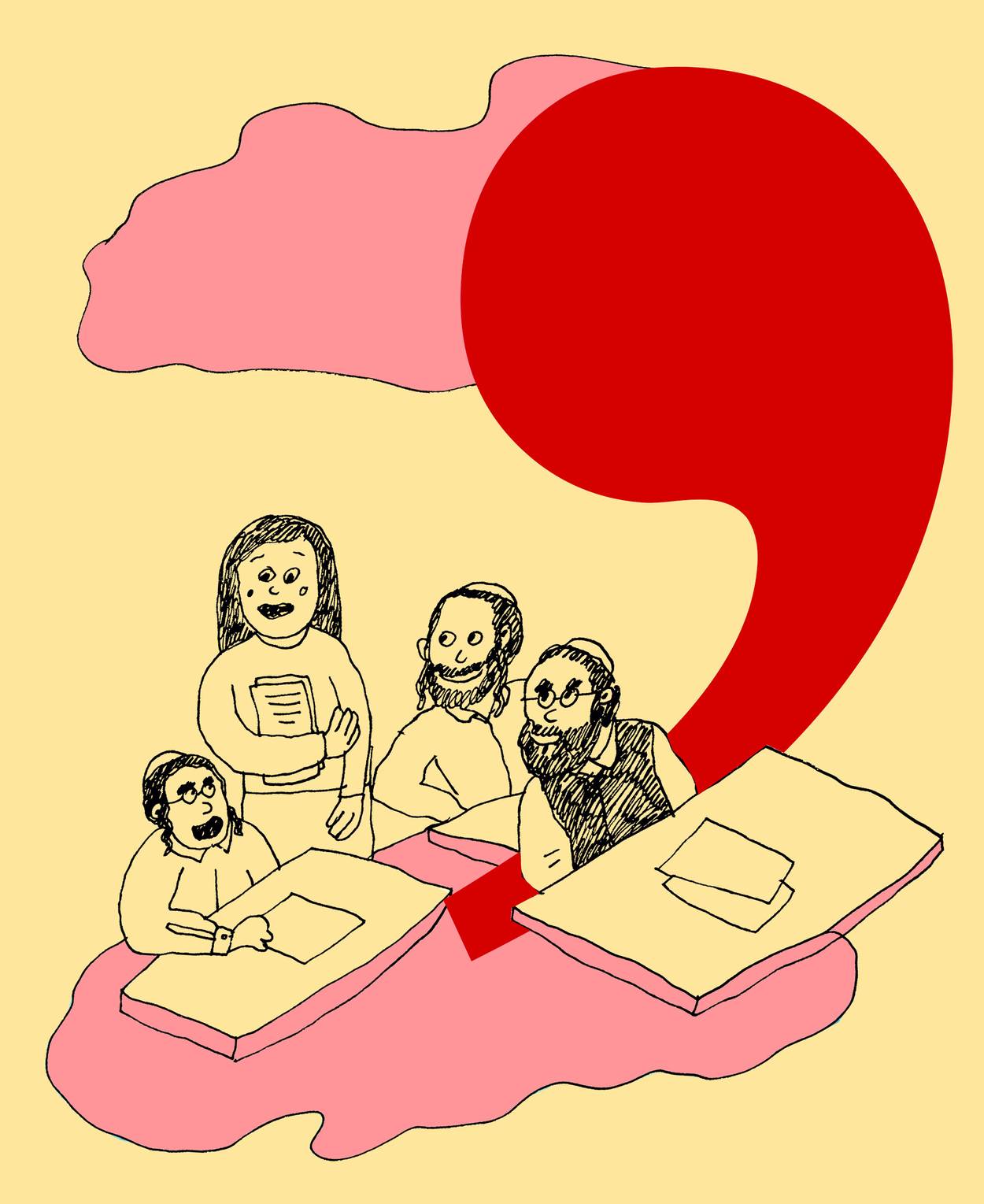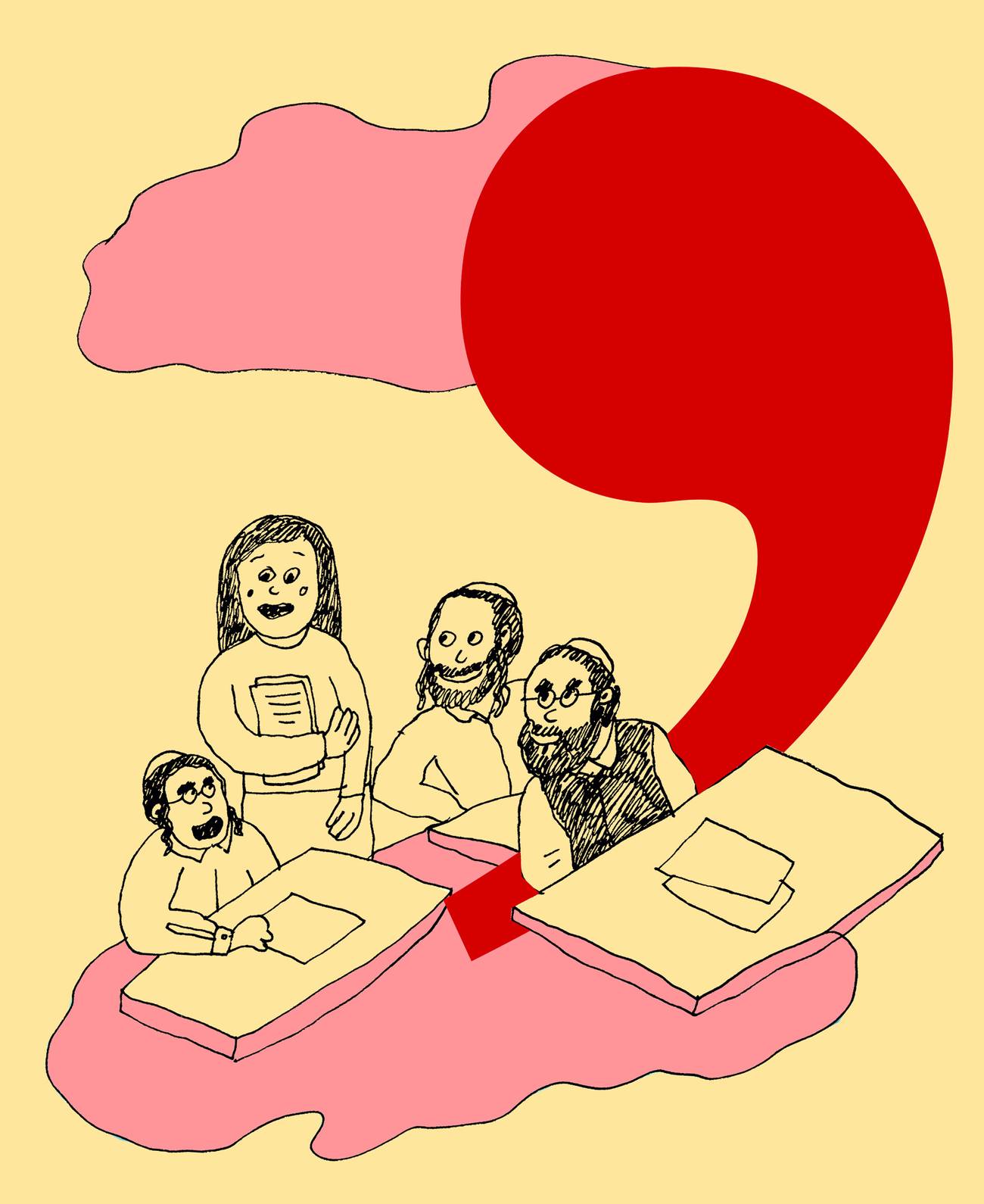The Oxford Comma Makhloykes
What I learned from teaching English grammar and punctuation to Hasidic adults




A makhloykes, for the uninitiated, is Yiddish for “argument” or “dispute”; its modern Hebrew counterpart is makhloket, although the latter seems to lack some of the “oomph” of its European mate. Think of the scene from Fiddler on the Roof: “Horse!” “Mule!” “No, it was a horse!” “I tell you it was a mule!”
If the comma is the bugaboo of punctuation, then the Oxford comma is its snobbish cousin. (Ironically, despite its lineage, the Oxford comma is not standard in the U.K.) It’s also referred to as a serial comma—the one placed before the last item in a series of three or more, as in: I visited Paris, London, and Rome. Because it is considered optional, the Oxford comma has become the standard bearer for persnickety grammarians (including this writer, I confess) and the source of virtual fisticuffs between its defenders and opponents. (I also confess to owning—and wearing—a T-shirt from the Oxford Comma Preservation Society, whose motto is “Defenders of Tradition, Form, and Clarity.”) It’s given rise to countless groanworthy examples purporting to prove its indispensability, to wit: “I love my parents, Batman and Superwoman.” (Without the comma after “Batman,” you might be laying claim to being a child of DC Comics’ Justice League.)
One would think that makhloykes, so redolent of mamaloshn, and the Oxford comma, with its British pedigree, would never meet in the same paragraph, let alone in a class of Hasidim. But I had a chance to witness these two words—and worlds—collide.
A few years ago, I volunteered to teach basic English to a group of adult Hasidim. This was a self-selected group, members of an organization established to support Hasidic Jews who feel disenfranchised yet wish to maintain their Orthodox observance. (There are other organizations, like Footsteps, that offer services to ex-Hasidim.)
Despite having been a language teacher for several decades, including many years devoted to English as a second language, I didn’t know where to begin. My students didn’t fit neatly into any category. They were, theoretically, native English speakers, but many—particularly the men—could write on a third-grade level at best. Yet they weren’t traditional ESL students either, having grown up in the United States, albeit in cloistered communities like Monroe, New York (which Hasidim pronounce MUN-roe, with the accent on the first syllable. Who knew?).
My students’ “About Me” emails (yes, all had internet access) told me volumes about what they didn’t know: what a sentence is, where one sentence ends and another begins, why “I speak a pretty good English” is not standard American English. Try correcting the Yiddish-informed syntax of “I am learning in this class many new things” without using the word “verb.” Forget about “direct object.” (The classic example, whether apocryphal or actually overheard in Monsey or New Square, is: “Throw me out the window a towel.”)
Some of the introductory emails broke my heart, and not just due to the lack of literacy. There was real yearning here, not only for punctuation rules, but also for knowledge of an outside world. There was excitement about making up for lost time, along with resentment over dead-end jobs and lost opportunities.
Now a little about myself first the first half of my childhood I grow up in Williamsburg and at age 11 we moved to ... then at age 14 I went to yeshiva out of town and at age 17 I switched yeshiva and then I got married and now we have 3 kids a girl a boy and a girl (wow I never wrote such a long email by myself)
The seculer education at the school i attended wasnt very good, we had class only on 4 days of the week and only for an hour, i have a lot to catch up and i really hope my kids will have it better then me.
I grew up in a neighborhood called Williamsburg, it’s located in Brooklyn, NY. While living in that neighborhood I thought this is how all jews (I didn’t knew much about gentiles) look like and live, but thank God by now I know, the universe is so big! There is so much more in the world than this tiny neighborhood called Williamsburg.
I’m very excited about the new English program, it’s very embarrassing not to be able to speak or write to someone without any grammar or spelling error.
The cultural gaps were more like chasms. One evening, having reminded the class that they would indeed make progress if they put in the effort, I found myself repeating that old chestnut “How do you get to Carnegie Hall?” (The answer: “Practice, practice.”) There was radio silence, first for a few seconds, then an uncomfortable few more. Finally, one participant asked, “What’s that?” “What’s what?” I countered. “The place you mentioned.” Not a single student had heard of Carnegie Hall.
The initial dedication the students brought to this class was remarkable. We met twice weekly for an hour, no small commitment. Some were comfortable using the camera on Zoom; others preferred just audio. One fellow joined the class on his iPhone from his car. More than one told me, sotto voce, that he was taking the class on the down-low.
After several weeks, many students had made astounding progress, becoming real experts in syntax and basic punctuation. One young man, whom I’ll call Yanky, was the class’s undisputed comma champion: He had mastered how to use commas in a series, how to set off appositives, how to correct run-ons and comma splices. If there was a comma to be found (or deleted), Yanky was your man. Naturally, he knew that the last comma in a series—that fiendish squiggle, the Oxford comma—is optional, subject to debate.
About halfway through the course, reviewing for the midterm, I asked if the punctuation in the following sentence was correct: “I enjoy learning the rules of capitalization, grammar, and punctuation.” (Remember, the last comma can either stay or go.)
My students were on to me; they seemed to know this was a trick question. No one ventured an answer. The tension mounted. Finally, Yanky’s voice rang out: “It’s a makhloykes!”
I doubt Strunk and White could have said it any better.
I wish this story had a less ambivalently happy ending. After more than a semester’s worth of instruction, I felt I had covered everything I had set out to teach. Attendance began to wane; indeed, the heads of the organization had warned me at the outset that, despite the students’ early enthusiasm, I shouldn’t have lofty expectations. What I perceived as inconstancy was a reflection of the sometimes insurmountable tension these individuals live with, trying to straddle two worlds. Once the course concluded, very few students stayed in touch with me. I actually don’t know what became of the participants or their aspirations, although I like to think that Chaim moved out of his bakery job and Shloimy got his GED.
Despite the ups and downs of the course, I remain optimistic about the potential future for Hasidim. Before our last session, one student asked if I would write a recommendation letter on his behalf to the “Mature Entry” program of a well-known university. I happily agreed and wrote in my letter: “I can state unequivocally that I have never been as enthusiastic in recommending a student for college study.” He was accepted. A happy ending? Perhaps. But at least a happy beginning.
Ann K. Brodsky is a language educator and freelance writer from northern New Jersey.